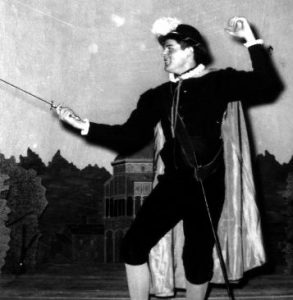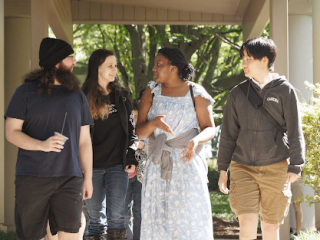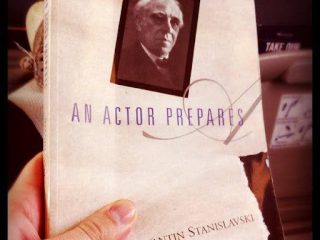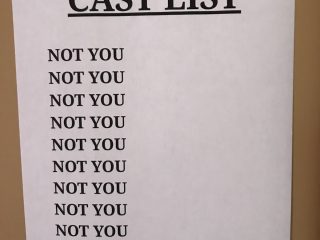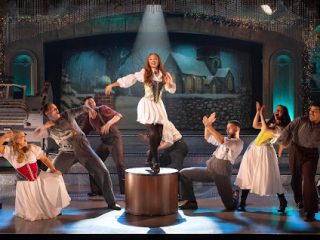I learned the greatest life lessons in summer stock theater. For five summers, deep in the redwoods, I bounced between the costume shop, wig shop, and backstage running two to three exhilarating shows a season. It tested my patience, challenged my body, and carved a hole in my heart no theater has been able to fill. I’m a better artist because of it, and a better person too.
Lessons in Patience
Summer stock tends to ask artists for immediate results. Time tables are tight; budgets are even tighter. The notion to rush is instilled on day one. But instead—pause, breathe. Good work takes time; fast work is not good, so find your middle ground. There is only one summer of these shows, these people, and (in my case) these costumes. Don’t rush through the moments just because time isn’t on your side. Be patient, the shows will open, and close long before you are ready. Don’t waste time. Take it all in, and know that whatever lesson the summer will teach you may not be apparent right away.
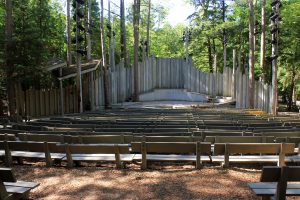
A Different Type of Design
I love repertory theatre, almost as much as I love outdoor theatre. It challenges the brain and body of actors and designers in a whole new way. Costumes are designed for the elements, long underwear becomes commonplace for cold nights, and outdoor-friendly shoes are your only design option. Clothing must read as regular and regal under the hot summer sun and evening stage lights. Scenic elements are designed for easy change-overs or usability in more than one production. Wigs and facial hair play a crucial role, helping actors transition from one Shakespeare role to another. All elements must stand alone as special, without overshadowing performances. Design is smarter, more versatile, and simple: the audience imagines the rest.
While actors frequently rehearse or learn lines for more than one show at a time, repertory theatre asked them to switch gears multiple times a day. While I’ve carried multiple backstage tracks in my head, for summer stock wardrobe crew, I cannot imagine the challenge of playing Iago in the afternoon and Puck in the evening. Factor in major temperature changes between shows, bugs, and seasonal allergies and outdoor theater becomes an Olympic event for actors.
Listening to Your Body
Whether you’re an intern, actor, or designer, summer stock can wreak havoc on your body. Hours on end sewing, building scenery, running crew, or rehearsing epic swordplay for The Three Musketeers challenges bodies in a way they aren’t used to. Eight shows a week feels like sixteen with morning rehearsals, evening shows, and post-show parties. Opportunities for rest are few and far between, and the fear of missing out can overshadow your body’s needs. Summer won’t last forever, and that’s a hard concept to manage. Just remember, summer stock is one of the many theatrical journeys you’ll enjoy in a career; make it count, but don’t forget to put yourself first.
Matters of the Heart
My first day of my first season, the artistic director told the story of a couple who met years prior at that very theater. They had returned, still in love, still in theatre. This was the dream. But, what I didn’t know, is that summer stock is summer camp for adults. There are summer loves, but often that’s all they are—a fling under the starlight inspired by the romanticism of Romeo and Juliet and the constant pressure of summer’s end is right around the corner. Years of this tested my heart. There was so much love to give, and love to receive in so little time. I grew to know I value the people over the art any day—the plays were just the vehicle that brought us together. I learned my love of the industry isn’t the work in costumes or hair, it’s the opportunity to interact with like minds as willing the open their hearts as I was.
No Task Is Too Large, No Task Is Too Small
When it comes to the truncated time and team spirit, summer stock taught me no task is beyond my reach. Whether it was simple swing tacks on costumes, crafting turbans for the first time, or helping the prop shop rig a dagger on a belt, I ended each summer with a handful of new skills, and practiced skills I’d nearly forgotten. There is no such thing as projects above or below a “pay grade,” instilling the humbling notion that I am valuable as an individual, but more importantly, I’m a part of the team.
My summers of outdoor theatre fueled my career faster than any class, seminar, or resume credit. I developed a breadth of skills in design, aesthetics, construction, hair, and makeup that I wouldn’t have experienced in college alone. But, most importantly it filled me heart with love and appreciation for every person and every step of the production process.

